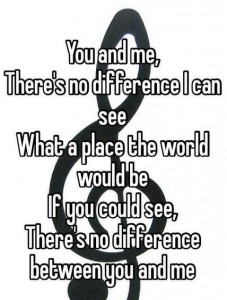In Jeremiah’s quest for one righteous person he searched the streets, shops, and house throughout Jerusalem and came up empty. He realized that the poor do not have the advantages of the education of the rich so changed his tactics. Instead of looking to the masses to find  a righteous person, he moved to the upper class. His search, however, reaped no more reward than his search in the streets of the City. Jeremiah 5:5 says, “I will go to the great and will speak to them, for they know the way of the LORD, the justice of their God. But they all alike had broken the yoke; they had burst the bonds.”
a righteous person, he moved to the upper class. His search, however, reaped no more reward than his search in the streets of the City. Jeremiah 5:5 says, “I will go to the great and will speak to them, for they know the way of the LORD, the justice of their God. But they all alike had broken the yoke; they had burst the bonds.”
There’s the sense that those who know better, were more culpable than those who sinned out of ignorance. I remember my mother telling me (on more than one occasion!) “You know better than that!” or “We taught you better than that.” This was especially the case when I got caught stealing expensive precision ball-bearings from a neighbor’s garage to use as ammunition in my sling shot. “You’re father and I have taught you better than that! You know it’s wrong and yet you did it anyway.” I got one of the worst spankings in my life after that. It was because I knew better and did it anyway. Ryken’s comment on this verse expresses this idea. He says, “Jeremiah compares the cultural elite to dumb oxen who have shattered their yokes. This image captures their willful disobedience. They sinned, not out of ignorance like regular folks, but in defiance of the Word of God. Since they broke free from divine authority, they were doubly culpable.”[1]
Jeremiah had become disillusioned with the high hopes of the liberal political agenda: “With enough education, enough charity, enough economic programs, we will perfect the human race. The revelation of Scripture and of this passage in particular is that the problem is sin. It infects the poor and the rich, the young and the old, male and female, educated and uneducated, nice people and nasty people.”[2] I’m convinced that many of Paul’s comments come from his profound understanding of the Prophet Jeremiah. Jeremiah makes clear that there is no difference between people, regardless of their status. The phrase “no difference” occurs twice in the book of Romans. It is used first with reference to our human sinfulness. “There is no difference, for all have sinned and fall short of the glory of God.” Second, it is used with reference to God’s grace extended to all who will call on Him. “For there is no difference between Jew and Gentile—the same Lord is Lord of all and richly blesses all who call on him, for, ‘Everyone who calls on the name of the Lord will be saved’” (10:12–13 NIV).[3] All have sinned, but “while we were yet sinners, Christ died for us.”
[1] Philip Graham Ryken, Jeremiah and Lamentations: From Sorrow to Hope, Preaching the Word (Wheaton, IL: Crossway Books, 2001), 87.
[2] John Guest and Lloyd J. Ogilvie, Jeremiah, Lamentations, vol. 19, The Preacher’s Commentary Series (Nashville, TN: Thomas Nelson Inc, 1988), 57.
[3] Galaxie Software, 10,000 Sermon Illustrations (Biblical Studies Press, 2002).